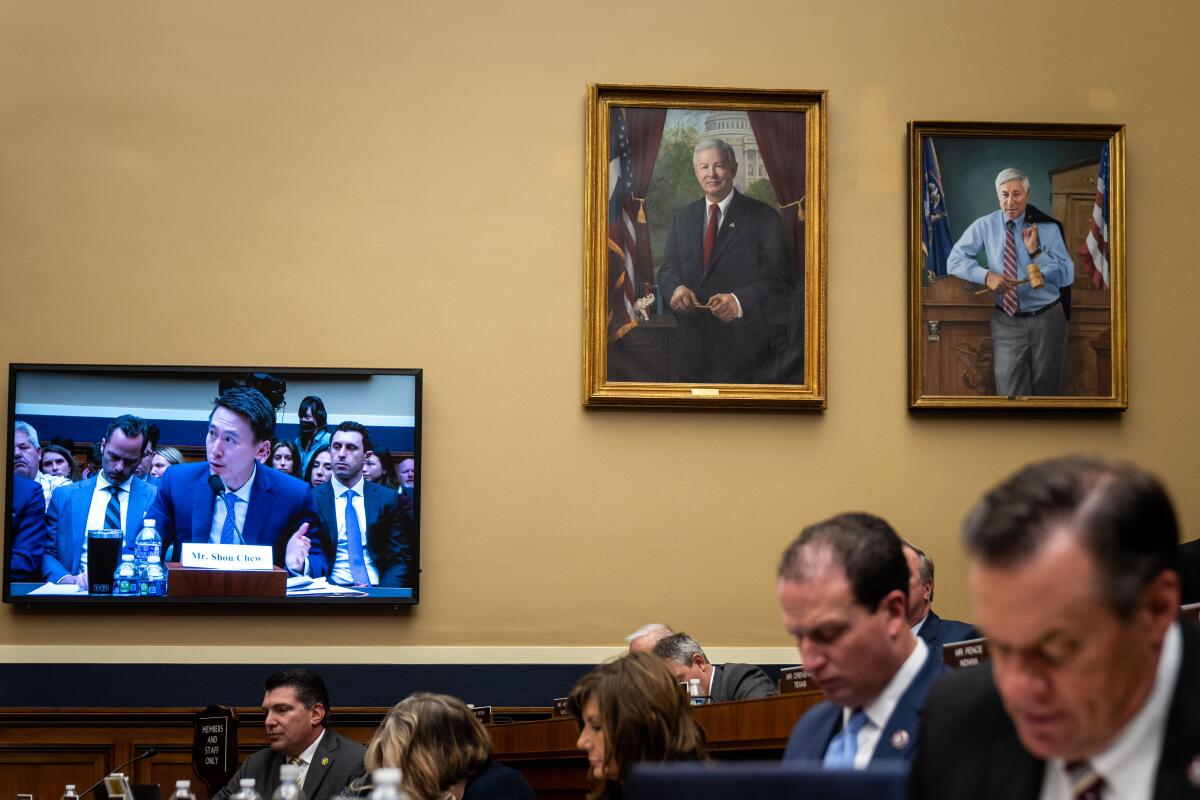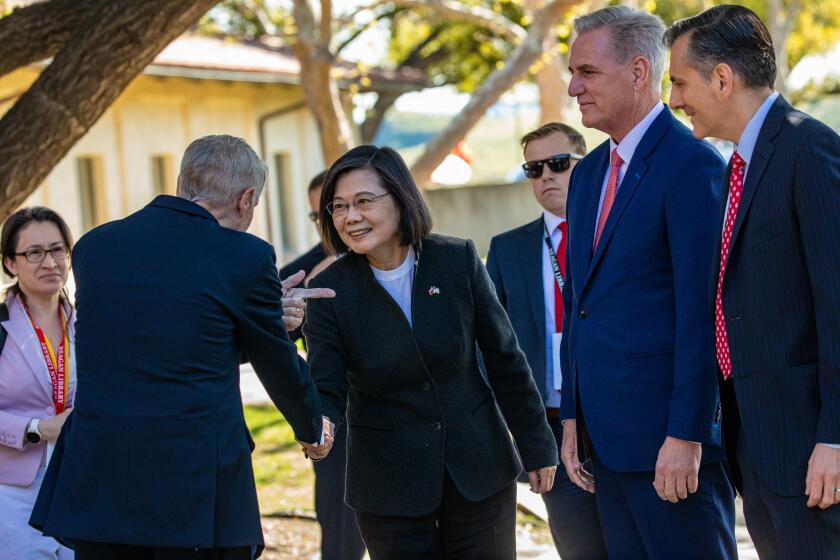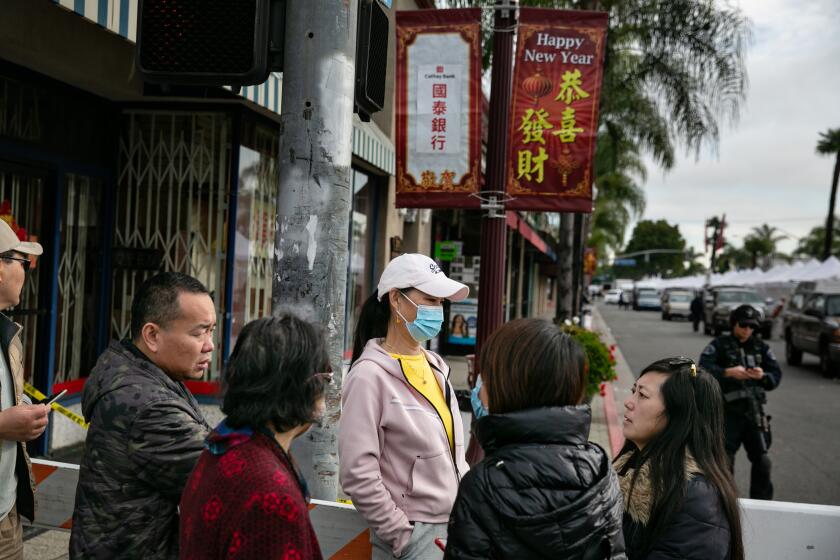U.S.-China tensions are feeding a new wave of anti-Asian hate

- Share via
The far-right website the Daily Caller recently smeared Asian American business leaders in L.A. as stooges of the People’s Republic of China. This portrayal — based on prejudice, not evidence — points to a trend we’re likely to only see expand. Amid widening U.S.-China tensions, American extremists and officials alike are stoking fears that will start another surge of racism toward Chinese people and others of Asian descent.
U.S. government leaders have been clear in their messaging: China, and anyone associated with it, may be a security threat. Lawmakers excoriated Shou Zi Chew, the Singaporean chief executive of the Chinese-owned social media platform TikTok, during last month’s congressional hearings, at times treating him and the app as a proxy for the Chinese government. During a university talk this month, FBI Director Christopher A. Wray again declared China the greatest “long-term” threat to the United States. “The current Chinese regime will stop at nothing to steal what they can’t create and silence the messages they don’t want to hear,” Wray claimed, “all in an effort to surpass us as a global superpower.” Others in the Biden administration, such as Defense Secretary Lloyd J. Austin III, have repeated this message.
The conflict between the U.S. and China over Taiwan’s sovereignty is political theater with drastic consequences.
Public officials have the right to — and should — critique other nations’ policies. Wray also did well to qualify his statement by saying: “To be clear, that threat stems from the Chinese government, not the Chinese people themselves.” But examples from the past and present tell us that this pattern of widely invoking the China threat has dangerous consequences for Americans of Asian descent, perpetuating long-standing stereotypes of Chinese and other Asian communities as foreign, dangerous and unscrupulous — an existential threat to the United States.
This message is coming after a couple of years of racist scapegoating of Asian Americans for COVID-19, and at a time when Americans’ view of China is the lowest it’s been in at least a decade. In 2022, 8 in 10 Americans polled by the Pew Research Center held an unfavorable opinion of China. That opinion can translate into more suspicion of Chinese individuals. A recent study by Princeton University researchers found that Americans who perceived China as a threat were also more likely to stereotype Chinese people as untrustworthy and immoral. Further, it found that those in Republican counties are more likely to homogenize East Asians as one group and extend these negative traits to other Asians in the U.S. as well. A 2021 survey estimated that nearly 1 in 5 Asian Americans — almost 5 million people — experienced a racist incident in the last year.
Yet despite these consequences, U.S. officials have long stoked xenophobia to serve a political agenda. In the 19th century, politicians blamed the American recession on Chinese migrants, who they charged stole white workers’ jobs and brought diseases to the West. By claiming that Chinese immigrants simply could not assimilate, the Workingmen’s Party riled up a voter base and swept into office.
While the motives of the perpetrator are still being investigated, Asian Americans remain a population forced to live on high alert.
Lawmakers then passed the Chinese Exclusion Act of 1882 and renewed it in 1892, institutionalizing discrimination against Chinese and other Asian immigrants by categorizing them as “aliens ineligible for citizenship” and sanctioning violence to expel them. In 1885 and 1886, mobs employed force to displace en masse 168 Chinese communities along the West Coast.
The animus against Chinese people is repeating in proposed policies today. Prompted by a Chinese developer’s proposed land purchase for a wind farm in Texas, the state banned infrastructure projects from entities with direct ties to China, and Gov. Greg Abbott endorsed expanding the ban to outlaw any property ownership by Chinese residents who aren’t U.S. citizens. (State lawmakers softened the bill, which would also apply to those from North Korea, Iran and Russia.) As of February, at least 11 state legislatures were considering legislation to limit Chinese landownership. In the broader push to ban books by minority authors nationwide, policymakers have sought to ban titles by Chinese American authors Kelly Yang, Malinda Lo and Laurence Yep (including “Dragonwings,” Yep’s Newbery honoree novel for children).
Ultimately, such hysteria is a measure of the American psyche. Today’s version of it speaks to Americans’ fears over our economic, moral and political standing in the world. Blaming other nations — and our own minority communities — for American woes is easier than reforming our faltering political and other systems.
If we truly believe in democratic ideals and values, let’s honor them. Rather than attacking groups to rile up voting blocs and stir up culture wars, we should safeguard our civil liberties and promote racial unity. Asian Americans, like everyone in the U.S., should be considered innocent until proved guilty, not assumed to be seditious or targeted as the result of others’ anxieties. The irony is that such fears stem from concerns about American weakness — but the resulting racism weakens our democracy.
Russell Jeung is a professor of Asian American studies at San Francisco State University. He is writing a book on anti-Asian racism and the Asian American movement for racial justice.
More to Read
A cure for the common opinion
Get thought-provoking perspectives with our weekly newsletter.
You may occasionally receive promotional content from the Los Angeles Times.








